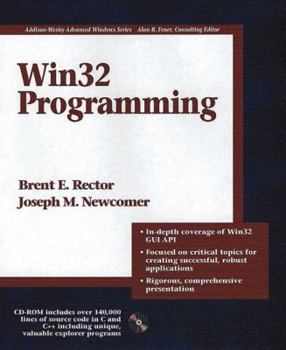Win32 Programming (Addison-Wesley Advanced Windows Series) 2 Volume Set (No CD)
Select Format
Select Condition 
Book Overview
Covering the material needed to understand and write 32-bit Windows applications for Windows 95 and Windows NT 3.51, this work details Win32 application programming concepts, and techniques for the... This description may be from another edition of this product.
Format:Paperback
Language:English
ISBN:0201634929
ISBN13:9780201634921
Release Date:January 1900
Publisher:Addison-Wesley Professional
Length:1568 Pages
Weight:5.65 lbs.
Dimensions:3.3" x 7.6" x 9.5"












